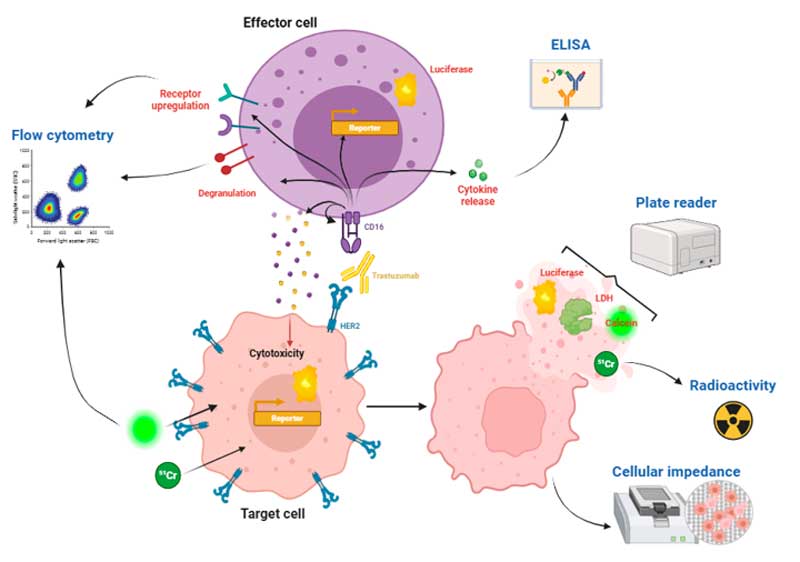
2025/07/14
How do our defenses help eliminate cancer? The key role of NK cells in antibody therapies
In recent years, antibody-based cancer treatments have become one of the most promising approaches for combating various types of cancer. But how do these drugs “teach” the immune system to attack tumor cells? The answer lies in a process called antibody-dependent cellular cytotoxicity, or ADCC.
A recent review, co-authored by Roos Vincken, Uxue Armendáriz-Martínez and led by Ikerbasque researcher Ana Ruiz-Sáenz, head of the Cancer Resistance Therapy Laboratory at CIC bioGUNE, delves into this mechanism and explores how it can be studied in the lab to develop more effective and long-lasting treatments.
Antibodies as Guides for the Immune System
Therapeutic antibodies act like a kind of “tag” on tumor cells, recognizing specific antigens on their surface. Once labeled, these cells become targets for the immune system, which is activated to destroy them. But antibodies don’t act alone, they need the help of some very special allies.
NK Cells: Natural Killers
The main players in this story are NK cells (short for natural killer), a type of white blood cell that patrols the body in search of abnormal cells. These cells recognize antibodies bound to tumor cells through a receptor called CD16. When activated, NK cells release molecules such as perforins and granzymes, which pierce and destroy the cancer cell.
"This mechanism is particularly crucial for the clinical efficacy of the antibody trastuzumab, used for the treatment of HER2-positive breast cancer patients" explains Ana Ruiz-Sáenz.
Reproducing the Human Body in the Laboratory
The article also reviews different experimental models used to study this phenomenon and highlights the importance of cancer-immune co-culture systems, which more realistically mimic the cellular environment in which these treatments operate. These models allow researchers to better analyze why some people respond to therapy while others don’t, or how tumor cells can develop resistance.
In addition, the review explores various techniques to measure NK cell activation and their ability to eliminate cancer cells—from flow cytometry, which can detect specific markers on cells, to bioluminescence assays and reporter systems that “light up” cell activity in real time.
Beyond the Lab: Toward More Personalized Therapies
This scientific review not only contributes fundamental knowledge but also has a clear applied goal: to improve drug design and move toward more precise and personalized oncology. Understanding the role of NK cells in the efficacy of antibody-based treatments is essential for optimizing current treatments and developing new therapies that can better adapt to each individual.
The work of Dr. Ana Ruiz Sáenz and her team at CIC bioGUNE, member of BRTA, is an example of the Basque research community’s commitment to global health and the value of investing in knowledge as a tool for social transformation.
Reference: Roos Vincken, Uxue Armendáriz-Martínez and Ana Ruiz-Sáenz. ADCC: the rock band led by therapeutic antibodies, tumor and immune cells. Front. Immunol. DOI: 10.3389/fimmu.2025.1548292.
About CIC bioGUNE
The Centre for Cooperative Research in Biosciences (CIC bioGUNE), member of the Basque Research & Technology Alliance (BRTA), located in the Bizkaia Technology Park, is a biomedical research organisation conducting cutting-edge research at the interface between structural, molecular and cell biology, with a particular focus on generating knowledge on the molecular bases of disease, for use in the development of new diagnostic methods and advanced therapies.
About Ikerbasque
Ikerbasque - Basque Foundation for Science - is the result of an initiative of the Department of Education of the Basque Government that aims to reinforce the commitment to scientific research by attracting, recovering and consolidating excellent researchers from all over the world. Currently, it is a consolidated organization that has 290 researchers/s, who develop their work in all fields of knowledge.
About BRTA
BRTA is an alliance of 4 collaborative research centres (CIC bioGUNE, CIC nanoGUNE, CIC biomaGUNE y CIC energiGUNE) and 13 technology centres (Azterlan, Azti, Ceit, Cidetec, Gaiker, Ideko, Ikerlan, Leartiker, Lortek, Neiker, Tecnalia, Tekniker y Vicomtech) with the main objective of developing advanced technological solutions for the Basque corporate fabric.
With the support of the Basque Government, the SPRI Group and the Provincial Councils of the three territories, the alliance seeks to promote collaboration between the research centres, strengthen the conditions to generate and transfer knowledge to companies, contributing to their competitiveness and outspreading the Basque scientific-technological capacity abroad.
BRTA has a workforce of 3,500 professionals, executes 22% of the Basque Country's R&D investment, registers an annual turnover of more than 300 million euros and generates 100 European and international patents per year.
See a large version of the first picture





